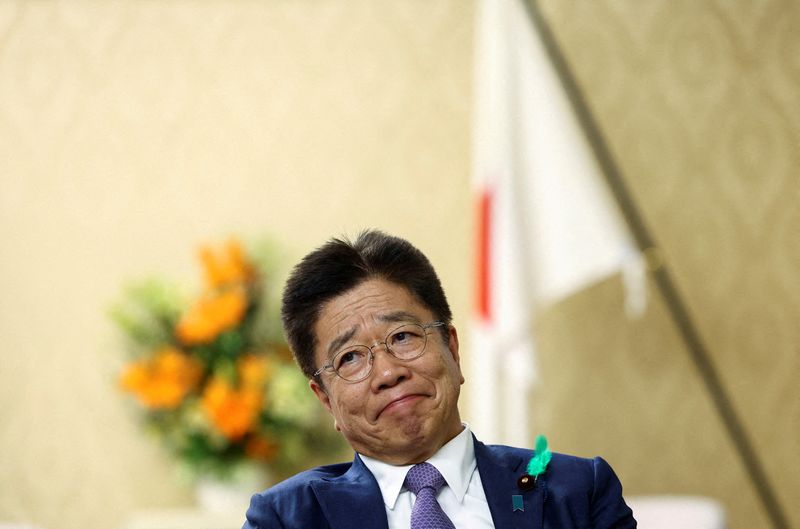Select Language

By Leika Kihara and Makiko Yamazaki
TOKYO (Reuters) -Japan could use its $1 trillion-plus holdings of U.S. Treasuries as a card in trade talks with Washington, its finance minister said on Friday, raising explicitly for the first time its leverage as a massive creditor to the United States.
While Finance Minister Katsunobu Kato did not threaten to sell holdings, his remarks touch on a critical concern global investors have about what Japan and China, the two largest owners of U.S. government debt, might do in seeking tariff concessions from the Trump administration.
The Treasury market saw a huge global sell-off last month after U.S. President Donald Trump’s decision on April 2 to slap sweeping tariffs on trading partners, including key strategic allies such as Japan.
Kato said in a television interview the primary purpose of Japan’s U.S. Treasury holdings - the largest in the world - is to ensure it has sufficient liquidity to conduct yen intervention when necessary.
"But we obviously need to put all cards on the table in negotiations. It could be among such cards," he said when asked whether Japan, in trade talks with the U.S., could reassure Washington it will not sell its Treasury holdings in the market.
"Whether we actually use that card, however, is a different question," Kato added.
The U.S. Treasury Department did not immediately respond to Reuters’ request for comment outside of office hours.
Kato’s remarks contrast with those he made last month, when he ruled out using Japan’s U.S. Treasury holdings in trade negotiations.
On Friday, Kato declined to comment on whether Tokyo’s U.S. bond holdings came up in his bilateral meeting with Treasury Secretary Scott Bessent last week.
However, he said the huge market sell-off in Treasuries in April likely affected Washington’s approach in talks with Japan.
Japan’s and China’s presence in the Treasury market makes them a huge point of attention whenever U.S. yields spike, although little is known about their trading activity.
While Japan, as a close U.S. ally, is seen as less likely to use its Treasury holdings as a bargaining tool, some analysts speculate that China may liquidate its holdings as a "nuclear" option as trade tensions with the U.S. escalate.
So far, there are few signs of such a sell-off. Foreign holdings of U.S. Treasuries rose 3.4% in February, data from the Treasury Department showed last month, with the two largest owners, Japan and China, building up their U.S. debt positions.
But even hints of their huge market presence could be a key weapon for Japan, which otherwise has little leverage due to its economy’s huge reliance on the U.S. car market.
"Playing the card early, while the U.S. bond market is in the minds of the administration after recent weeks, is a smart move," said Martin Whetton, head of financial markets strategy at Westpac in Sydney. "They don’t have to do anything. But they can put themselves in a solid position to negotiate. It is, after all, the art of the deal."
Japan’s top trade negotiator, Ryosei Akazawa, said he deepened talks on trade, non-tariff measures and economic security cooperation in his second round of talks with Bessent in Washington on Thursday. He also said the two sides hoped to hold their next meeting in mid-May.
USE ALL TOOLS
The U.S. Treasury sell-off in April was among factors that led Trump to announce a 90-day pause on his "reciprocal" tariff plan, with Bessent likely playing a key role, according to sources close to the White House.
Aside from the tariffs, Japan has also faced criticism from Trump that it was intentionally weakening the yen to give its exports a trade advantage - an accusation Tokyo denies.
Kato said his meeting with Bessent last week did not discuss any desirable exchange rate or a possible framework to control currency moves.
Analysts say Japan’s huge Treasury holdings can also be used as a bargaining tool in any differences Washington has with Tokyo over currencies.
"(It) should be a card if not an ace card for the negotiation," said Naka Matsuzawa, chief macro strategist at Nomura Securities in Tokyo. "It would work not only to flatten the (bond yield) curve in the two countries but also avoid other outrageous requests such as artificial yen appreciation."
But there are at the same time limits to such threats as unloading Treasuries would hurt Japan and China by disrupting markets and causing huge losses on their remaining holdings.
Given the hit Japan and China themselves would suffer from selling their U.S. Treasury holdings, the idea was an "absolute non-issue in the past," said Nathan Sheets, former U.S. undersecretary for international affairs who is currently global chief economist at Citi Research.
"But countries have to use all the tools they have," he said. "The fact that we need to think about something like that shows the world we’re in."

